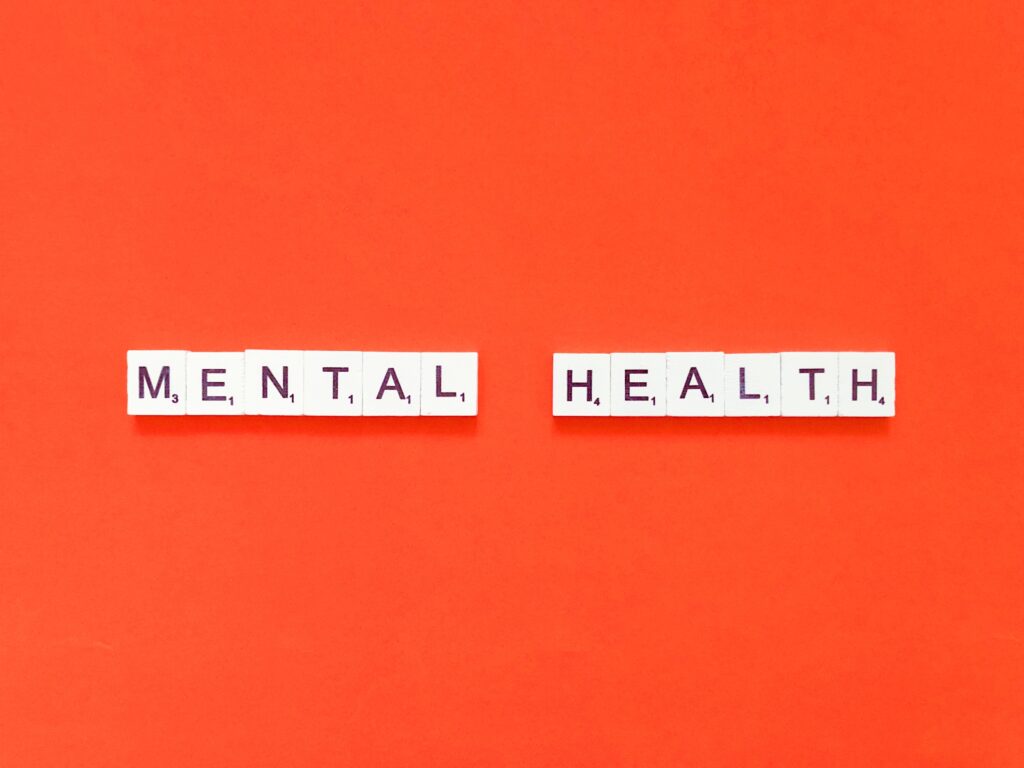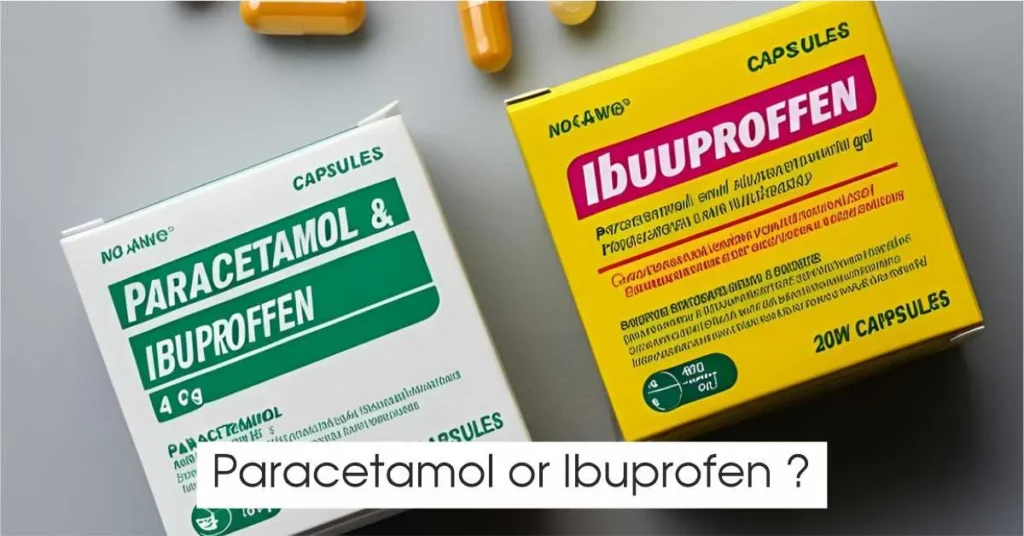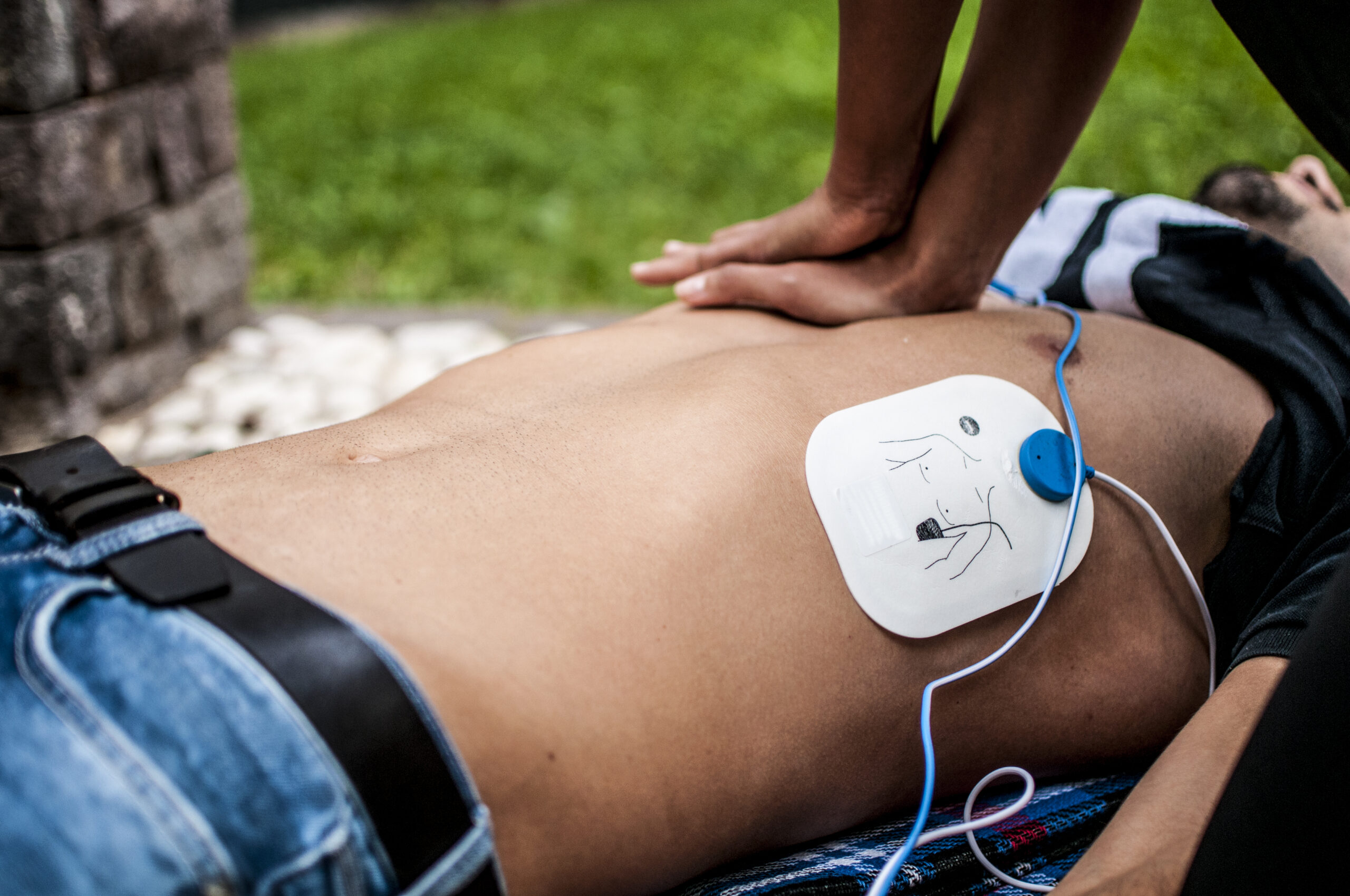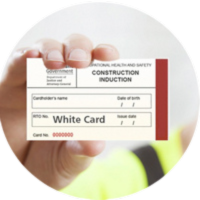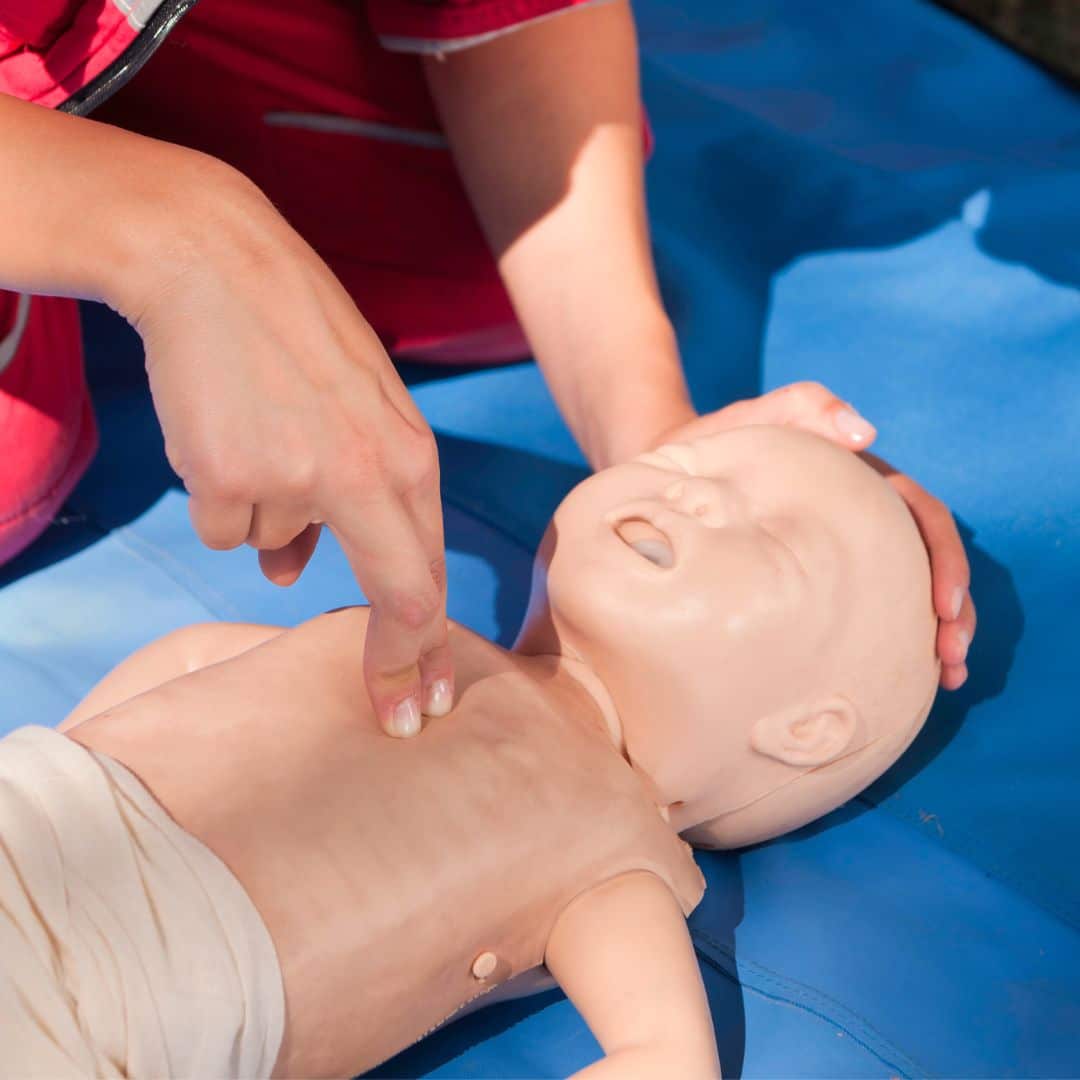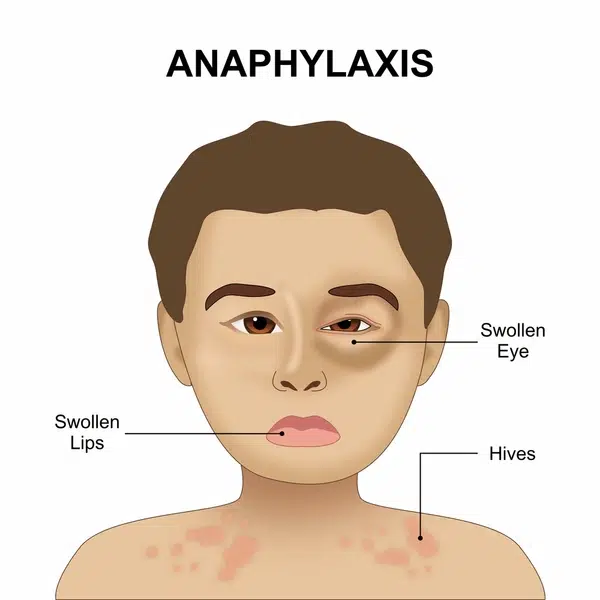Mental health first aid refers to the immediate assistance offered to a person who may be developing a mental health condition or going through a crisis. In the same way that physical first aid trains us to act quickly during accidents or injuries, a mental health first aid course prepares everyday Australians to identify, understand, and respond to early signs of mental health concerns in the workplace, community, and at home.
With one in five Australians facing mental health challenges each year, learning these skills can play a crucial role in someone’s path to recovery. This guide will walk you through recognising warning signs, beginning supportive conversations, offering initial care, and guiding individuals towards professional support services.
Want to strengthen your ability to support others? Enrol in First Aid Pro Adelaide’s nationally recognised Mental Health First Aid course today and build the confidence to make a genuine difference in your workplace and community.

Key Takeaways
- Mental Health First Aid (MHFA) gives everyday adults practical skills to recognise early warning signs, start supportive conversations, and offer initial help until professional care is in place.
- Be culturally sensitive: experiences and help-seeking vary across communities; use respectful, non-judgemental language.
- Common concerns to watch for include depression, anxiety (incl. panic attacks), and psychosis—each with distinct indicators.
- Use the ALGEE framework: Approach, Listen without judgement, Give reassurance/support, Encourage professional help, Encourage other supports.
- In a crisis (e.g., suicidal thoughts, panic attacks, severe distress): stay with the person, keep them safe, and seek urgent help—call 000 or Lifeline 13 11 14.
- Communication matters: ask open-ended questions, practise active listening, avoid stigmatising or dismissive phrases, and use person-first, hopeful language.
- MHFA complements—but does not replace—clinical care; it cannot diagnose, prescribe, or guarantee outcomes.
- Know referral pathways: GP (care plans), psychologists, psychiatrists, social workers; plus national services like Beyond Blue, headspace, SANE, Black Dog Institute and more.
- Building a support network (family, peers, EAP, community groups) and promoting self-care helps sustain recovery.
- First Aid Pro Adelaide’s accredited MHFA training is nationally recognised, can contribute to CPD, and includes a certificate issued by Mental Health First Aid Australia.
Understanding Mental Health First Aid: A Proactive Approach
Defining Mental Health First Aid
Mental health first aid refers to the immediate assistance offered to someone who may be developing a mental health concern or going through a crisis. This support continues until professional care is available or the situation stabilises.
Core principles of MHFA include:
- Acting early to prevent conditions from worsening
- Recognising that anyone can learn these vital skills
- Supporting but not replacing professional treatment
- Helping to reduce stigma and build stronger mental health awareness

How Mental Health First Aid Differs from Professional Mental Health Care
Mental Health First Aid | Professional Mental Health Care |
Initial support and crisis intervention | Ongoing treatment and therapy |
Available from trained community members | Provided by qualified health professionals |
Focuses on immediate safety and support | Includes diagnosis and treatment planning |
Connects people to professional help | Delivers ongoing professional treatment |
Usually short-term assistance | Can be long-term therapeutic relationship |
Understanding the Limitations of Mental Health First Aid
What MHFA can — and cannot — provide in supporting people experiencing mental health challenges.
What MHFA CAN Do
- Provide initial support in crisis
- Help someone feel less alone
- Connect people with professional help
- Reduce stigma and increase understanding
- Guide individuals to appropriate resources
What MHFA CANNOT Do
- Diagnose mental health conditions
- Provide therapy or counselling
- Prescribe medication
- Replace professional treatment
- Guarantee specific outcomes
Recognising the Signs: Offering Mental Health First Aid Support
Being Culturally Sensitive in Mental Health First Aid
Mental health first aid training recognises that people from different cultural, social, and community backgrounds may experience mental health challenges in unique ways. Factors such as cultural values, traditions, language, and life experiences can all influence how symptoms present and how individuals seek help. A sensitive, respectful approach that values diversity and promotes understanding is vital to offering meaningful support across all communities.
Early Warning Signs to Notice
Most mental health conditions develop gradually, and early identification can lead to better outcomes. Learning to recognise the signs below can help you support someone before their situation becomes more serious.

Common Mental Health Concerns — Warning Signs
A quick-reference guide to recognise early changes and respond with supportive, culturally sensitive care.
Mood, Energy & Interest
- Persistent low mood or sadness (2+ weeks)
- Loss of enjoyment in usual activities
- Changes in sleep or appetite
- Ongoing fatigue or low energy
- Difficulty concentrating or making decisions
- Feelings of guilt or worthlessness
- Withdrawing from family, friends, or community
Worry, Arousal & Avoidance
- Persistent worry or fear about everyday situations
- Physical signs: racing heart, trembling, sweating
- Avoiding places, people, or activities
- Restlessness or feeling “on edge”
- Sleep difficulties related to worry
- Sudden panic attacks or intense episodes of fear
Perception, Thinking & Behaviour
- Hearing voices or seeing things others don’t
- Unusual, fixed, or highly suspicious beliefs
- Marked shifts in behaviour or personality
- Difficulty distinguishing reality from imagination
- Extreme distrust or paranoia
- Disorganised thinking, speech, or communication
Tip: Warning signs vary across individuals and cultures. If you’re concerned, start a calm, non-judgemental conversation and encourage professional support. For urgent risk of harm, call 000.
Want to gain the skills to support others effectively?
Enrol in First Aid Pro Adelaide’s Mental Health First Aid CourseIdentifying a Mental Health Crisis
A mental health crisis is a situation that demands urgent attention and care. A Mental Health First Aid (MHFA) course equips you with the ability to spot the warning signs, know when professional intervention is essential, and understand the pathways for accessing the right support services.
Crisis Type | Warning Signs | Immediate Action |
Suicidal Thoughts and Behaviours | Talking about death, giving away possessions, sudden calmness after depression | Stay with the person, call 000 or Lifeline 13 11 14 |
Panic Attacks | Intense fear, chest pain, difficulty breathing, feeling of losing control | Stay calm, encourage slow breathing, reassure them |
Non-Suicidal Self-Injury | Unexplained cuts or burns, hiding injuries, discussing self-harm | Express concern, avoid judgment, encourage professional help |
Aggressive Behaviours | Threats, violence, inability to calm down | Ensure safety, seek immediate medical attention |

Starting the Conversation: Mental Health First Aid in Workplace Settings
How to Approach a Colleague in Crisis
Opening a dialogue about mental health concerns calls for empathy, patience, and the right timing. In workplace environments, it’s important to select a private, safe space where interruptions are unlikely. When you begin, focus on sharing your observations rather than making assumptions, creating a respectful and supportive atmosphere for the person you’re assisting.
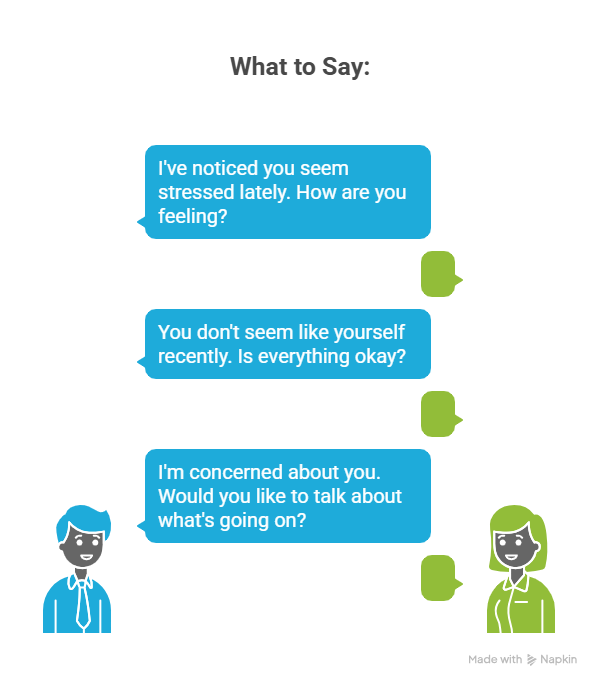
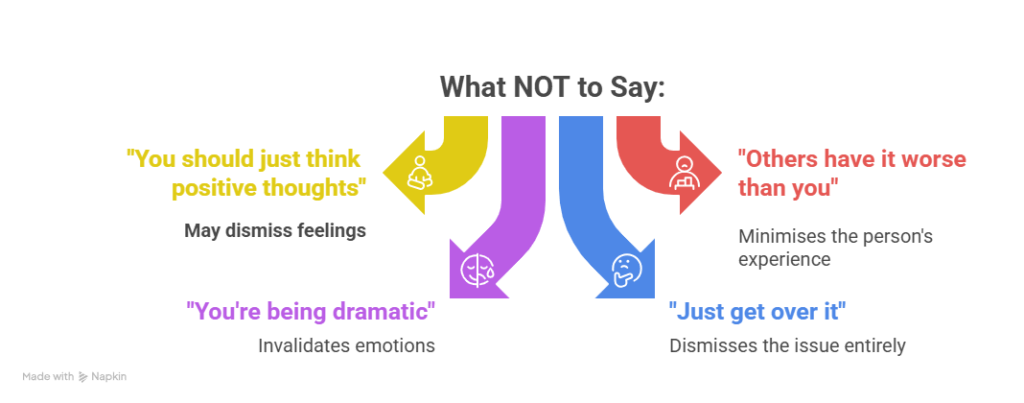
Building Mental Health Awareness Through Communication
Understanding Mental Health Literacy
Mental health literacy means having the knowledge to recognise mental health concerns and the confidence to respond in a supportive way. Using open-ended questions is one of the most effective tools for encouraging meaningful conversations, such as:
- “Can you tell me what this has been like for you?”
- “How long have you noticed these feelings?”
- “What do you think might make things better?”
- “Who do you usually turn to when things feel difficult?”
- “What would make this moment a little easier for you?”
Active Listening Skills in Mental Health First Aid
Good listening skills are essential for anyone providing first aid support. Techniques that strengthen connection and trust include:
- Giving your undivided attention — put aside phones or distractions
- Using open and positive body language to show you’re engaged
- Reflecting back key points, e.g., “It sounds like this situation feels overwhelming for you”
- Asking thoughtful clarifying questions to gain deeper understanding
- Avoiding interruptions, judgement, or jumping straight to quick fixes

MHFA Training Essentials — The ALGEE Action Plan
A simple, evidence-based framework to guide your response when providing Mental Health First Aid.
Approach the Person
- Notice distress or behavioural changes
- Choose the right time and private place
- Be respectful and calm, not confrontational
Listen Without Judgement
- Give your full attention
- Allow them to express their feelings
- Avoid interrupting or rushing solutions
Give Support & Reassurance
- Provide empathy and understanding
- Share accurate mental health information
- Offer practical help if appropriate
Encourage Professional Help
- Discuss available support services
- Offer assistance in connecting with help
- Respect their choices in decision-making
Encourage Other Supports
- Identify supportive family and friends
- Suggest healthy coping strategies
- Connect with peer or community groups
Tip: ALGEE gives you a structured approach, but every conversation should be guided by empathy, patience, and cultural sensitivity.
Ready to build your skills in Mental Health First Aid?
Enrol in First Aid Pro Adelaide’s Accredited MHFA CourseMental Health Support Through Non-Judgmental Communication
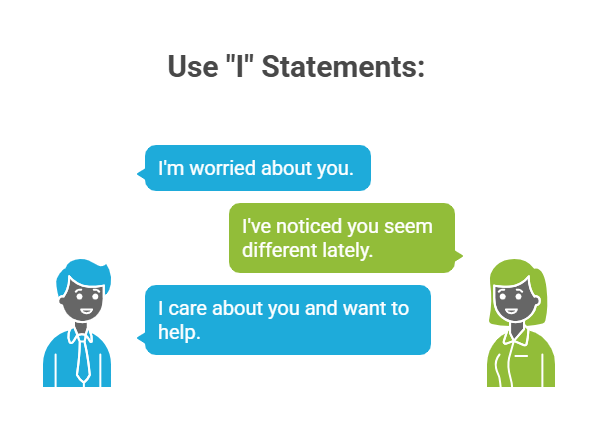
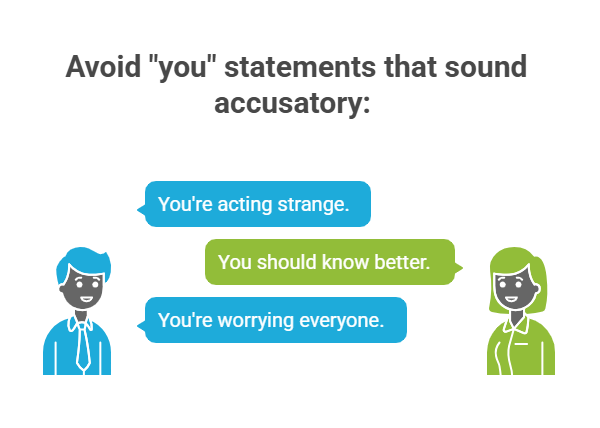
Creating Safety and Mental Health Support
Immediate comfort measures:
- Ensure physical safety first
- Provide a calm, quiet environment
- Offer practical support (water, comfortable seating)
- Respect personal space and boundaries
- Ask what they need to feel safe
Interested in a mental health first aid course that’s recognised throughout Australia? First Aid Pro Adelaide’s Mental Health First Aid course is delivered by accredited MHFA instructors and provides nationally recognised skills that employers value.
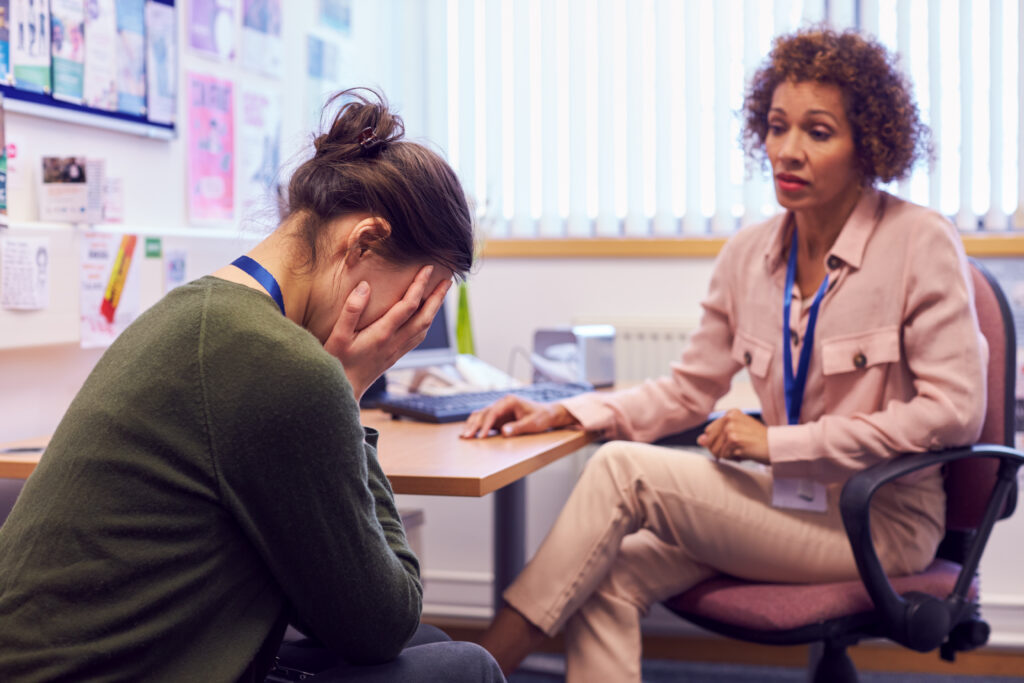
Mental Health Crisis Care: Key Skills for Urgent Situations
Supporting Someone in Crisis
Quick steps for responding to suicidal thoughts, self-injury, and panic attacks.
Suicidal Thoughts & Actions
- Take it seriously — never dismiss or minimise
- Ask directly: “Are you thinking about suicide?”
- Stay with them — don’t leave them alone
- Remove harmful means if possible
- Get help immediately — call 000 or Lifeline 13 11 14
- Follow up and check in regularly
Non-Suicidal Self-Injury
- Stay calm and avoid judgement
- Provide first aid for any injuries
- Encourage seeking professional help
- Support them in creating safety plans
- Connect with suitable services
Panic Attacks
- Remain calm and reassuring
- Encourage slow, deep breathing
- Help them focus on surroundings
- Remind them the episode will pass
- Stay with them until they’re settled
Grounding Techniques
- 5 things they can see
- 4 things they can touch
- 3 things they can hear
- 2 things they can smell
- 1 thing they can taste
Note: Always take crisis situations seriously. Stay calm, provide reassurance, and seek professional support without delay.
Want to gain the skills to respond confidently in a crisis?
Enrol in First Aid Pro Adelaide’s Mental Health First Aid CourseEmergency Contacts for Mental Health Crisis
Service | Phone Number | When to Use |
Emergency Services | 000 | Immediate danger to self or others |
Lifeline | 13 11 14 | Suicide prevention, crisis support |
Beyond Blue | 1300 22 4636 | Depression, anxiety support |
Kids Helpline | 1800 55 1800 | Support for young people under 25 |
MensLine Australia | 1300 78 99 78 | Men’s mental health support |
1800RESPECT | 1800 737 732 | Domestic violence support |
Professional Help and Mental Health First Aid Resources Australia
Encouraging Professional Help
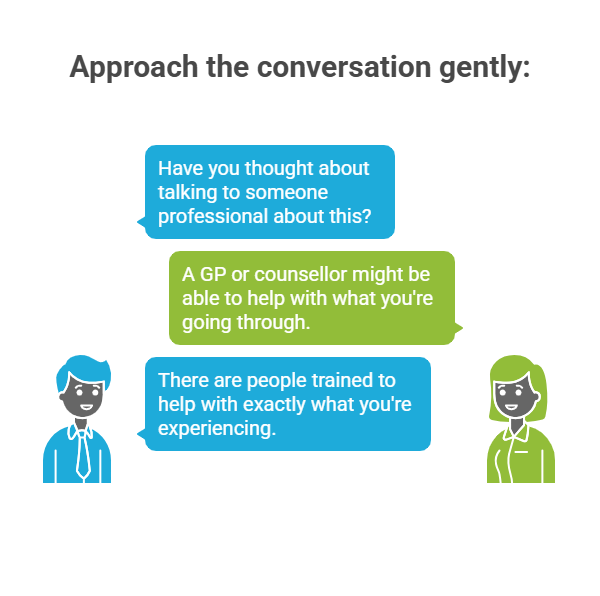
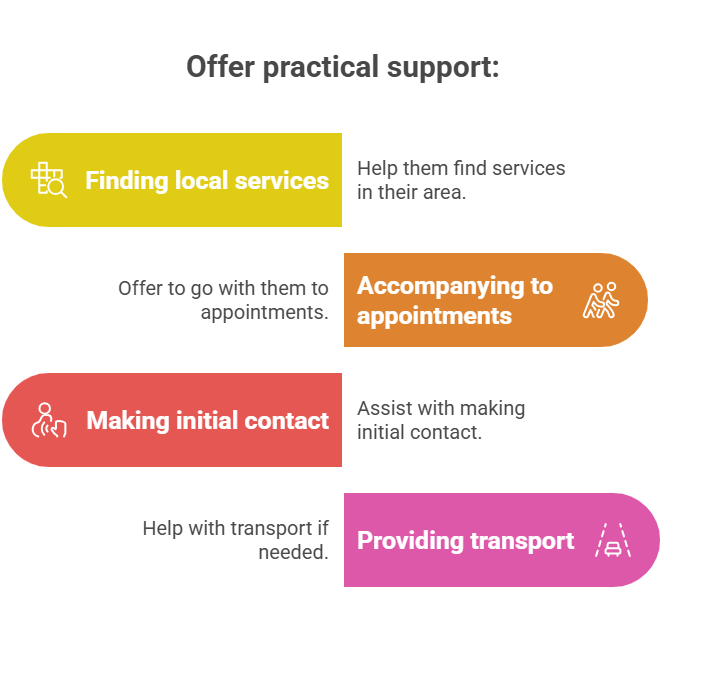
Mental Health First Aid Resources
Trusted options for professional care, phone/online help, peer and community support, and self-help tools.
Primary Care Options
- General Practitioner (GP) — first point of contact; can prepare Mental Health Care Plans
- Psychologist — evidence-based therapy and counselling
- Psychiatrist — medical specialist in mental health; can prescribe medication
- Social Worker — practical support, advocacy, community connections
Online & Telephone Support
Accessing Community Support
- Local community centres often host support groups
- Online forums and safe peer communities
- Workplace Employee Assistance Programs (EAP)
- Religious or spiritual communities
- Mental health apps such as Smiling Mind or MindSpot
- Structured online therapy programs
- Evidence-informed self-help books and digital guides
- Exercise, sleep, and wellness programs
In an emergency: call 000. For immediate support, contact Lifeline 13 11 14 or Suicide Call Back Service 1300 659 467.
Build practical skills to support others with confidence.
Enrol in First Aid Pro Adelaide’s Mental Health First Aid Course
Promoting Recovery and Reducing Stigma Through Mental Health First Aid
Language That Supports, Not Stigmatises
When supporting people with mental health concerns, the words we choose can either create barriers or open doors. Stereotypes and negative labels reinforce stigma and may discourage someone from seeking help. Instead, use respectful, non-judgemental language that separates the person from their symptoms. This approach helps create emotional space between the individual and the difficulties they’re facing, allowing them to feel supported rather than defined by their challenges.
Language to Avoid to Reduce Stigma Around Mental Health
Use people-first, hopeful language. Avoid stigmatising or dismissive terms that can become barriers to help-seeking.
Stigmatising Terms (Avoid)
- “Crazy”, “nuts”, “psycho”
- “Attention-seeking”
- “Just snapping out of it”
- “Being dramatic”
Dismissive Phrases (Avoid)
- “Everyone gets sad sometimes”
- “You have nothing to be depressed about”
- “Just think positive”
- “It’s all in your head”
Be Mindful of Your Responses
- “Person with depression” (not “depressed person”)
- “Person experiencing anxiety” (not “anxious person”)
- “Person with bipolar disorder” (not “bipolar person”)
- “Recovery is possible”
- “You’re not alone in this”
- “This is treatable”
- “Things can get better”
Supporting Recovery Within Communities
- Maintain regular contact and check-ins
- Include people in social activities
- Respect treatment choices
- Celebrate small improvements
- Be patient with setbacks
- Learn about their condition
Tip: Words matter. Separate the person from the condition, show respect, and offer hope.
Want practical ways to communicate supportively and reduce stigma?
Enrol in First Aid Pro Adelaide’s Mental Health First Aid Course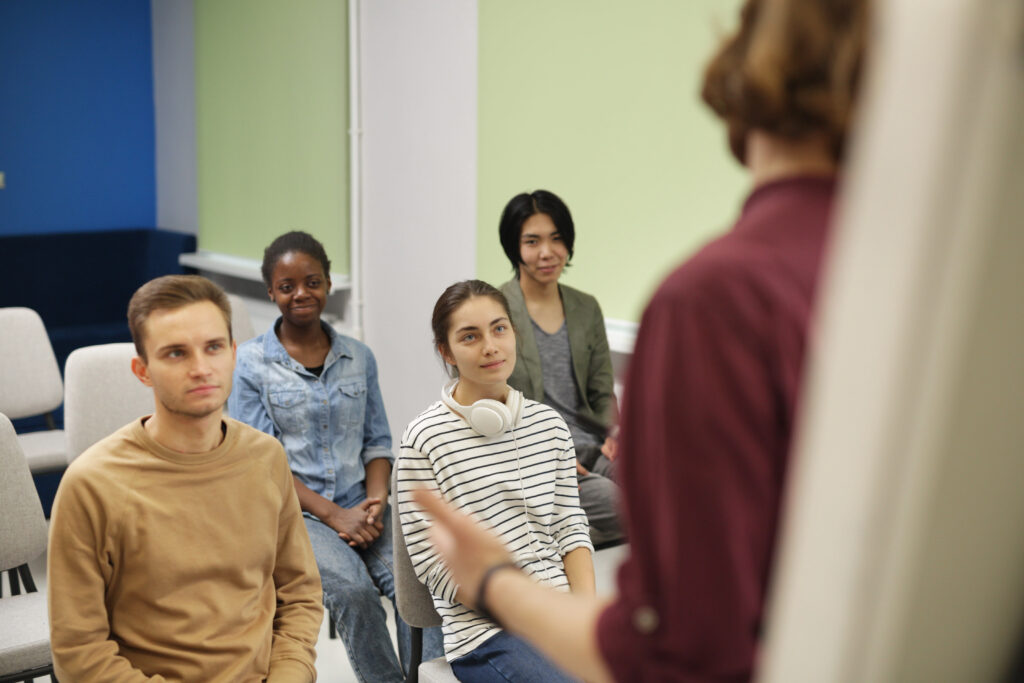
What You’ll Learn in First Aid Pro Adelaide’s Mental Health First Aid Course
Our Mental Health First Aid course provides adults with the knowledge and practical skills to offer initial support to someone experiencing a developing mental health problem or crisis. Participants learn how to recognise early warning signs, provide reassurance and assistance, and respond effectively in urgent situations such as suicidal thoughts, panic attacks, or psychosis. The course offers a comprehensive overview of mental health concerns and equips learners with evidence-based strategies to recognise, respond, and connect people with the right support services. This includes:
- Introduction to mental health and the importance of awareness
- Identifying symptoms and behaviours linked to developing or existing mental health conditions
- Pathways to professional support and referral options
- The ALGEE action plan — a structured framework for providing Mental Health First Aid
- First Aid for developing mental health problems
- First Aid for crisis situations, including suicide risk, panic, or psychosis
- Discussion of treatments and recovery options for mental health conditions
- Depression and suicidal ideation
- Anxiety, panic attacks, and trauma-related events
- Psychosis, schizophrenia, and bipolar disorder
- Substance use, gambling addiction, eating disorders, and aggressive behaviours
- Practical mental health resources to support ongoing recovery
On completion, participants receive a Mental Health First Aid certificate, issued by Mental Health First Aid Australia (MHFA). Delivered by First Aid Pro Adelaide, this accredited course is also recognised as contributing towards Continuing Professional Development (CPD) for those working in healthcare and related industries.
Knowledge & Confidence Test — Mental Health First Aid
Choose one answer for each question, then select Check answers. You can reset the quiz anytime.
1) What does MHFA stand for?
2) How many people in Australia experience mental health issues each year?
3) What should you do if someone is experiencing suicidal thoughts?
4) How long is a standard mental health first aid course?
5) How often should mental health first aid certification be renewed?
Note: For crisis situations call 000 or Lifeline 13 11 14.
References
- Mental Health First Aid Australia. (2023). Mental Health First Aid Guidelines. MHFA Australia.
- Australian Bureau of Statistics. (2022). National Study of Mental Health and Wellbeing. Australian Government.
- Jorm, A. F., Kitchener, B. A., & Mugford, S. K. (2005). Experiences in applying skills learned in a Mental Health First Aid training course: a qualitative study of participants’ stories. BMC Psychiatry, 5(1), 43.
- Livin: Livin.org
- Kitchener, B. A., & Jorm, A. F. (2008). Mental Health First Aid: an international program for early intervention. Early Intervention in Psychiatry, 2(1), 55-61.
- Australian Government Department of Health. (2023). National Mental Health Strategy. Commonwealth of Australia.
- Emerging Minds. (2023). Supporting Aboriginal and Torres Strait Islander Mental Health. Emerging Minds.
Frequently Asked Questions
Can I provide mental health first aid without formal training?
While anyone can offer basic support, empathy, and a listening ear to someone experiencing mental health challenges, completing a mental health first aid course is highly recommended. Training provides you with evidence-based strategies—originally developed by Betty Kitchener and Professor Tony Jorm—that help you:
- Recognise the signs and symptoms of common mental health problems and crises.
- Understand your role and its limitations as a first aider.
- Respond effectively and confidently in a variety of situations, including crises.
- Learn about important legal, ethical, and safety considerations.
- Reduce stigma and encourage appropriate professional help.
What if someone doesn't want my help when they're facing mental health challenges?
Respect their autonomy while expressing your concern. You can say, “I’m here if you change your mind” and continue to check in occasionally. If they’re in immediate danger, you may need to seek professional help even without their consent. Remember, you can’t force someone to accept help, but you can make it clear that support is available.
How do I know if someone needs professional help versus just mental health support?
Professional help is usually needed when symptoms persist for more than two weeks, significantly impact daily functioning, or involve safety risks. Signs include experiencing suicidal thoughts, inability to care for themselves, symptoms of psychosis, or severe depression/anxiety. When in doubt, encourage them to speak with a GP who can assess their needs.

